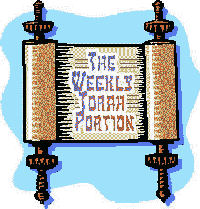Search our Archives:
» Home
» History
» Holidays
» Humor
» Places
» Thought
» Opinion & Society
» Writings
» Customs
» Misc.
|
Morality and Human Nature
By Michael Chessen
The portion of Mishpatim marks a turning point in the
Torah's textual progression. The entire book of Genesis and the beginning
of Exodus consisted entirely of a narrative without providing us with any
explicit commandments to follow. The exodus from Egypt ushered in a number
of commandments which dealt primarily with observance of the festival of
Passover, and Yitro introduced the famous Ten Commandments. It is only in
the portion of Mishpatim, however, that we begin the erudition of the
detailed commandments in earnest.
Now after all that God has done for us: making us a nation,
promising us the Land of Israel, liberating us from Egyptian bondage, and
choosing us to receive his precious Torah, we might expect that God's
first demands of us would involve His praise and worship. Whereas a number
of Mishpatim's many commandments are indeed worship oriented, the lion's
share of the portion's commandments actually concern themselves with
morality and ethical justice.
This leads us to ask why we need a divine edict to ensure
that people get along with one another. After all, the ancient Greeks
developed a simple premise. This being, that individuals would naturally
treat one another justly in order to receive just treatment themselves. A
basic shortcoming here was that there was no basic principle which ensured
that stronger groups could not team up and persecute or even annihilate
weaker groups on the basis of race or beliefs. The Torah, for its part,
established in the opening account of creation that Adam, from whom all of
humankind emerged, was created in the image of God. Therefore, if one
murdered or even in any way intentionally sought to damage a human being,
one would be desecrating holiness.
We may be able to envision a skeptic acknowledging that
while this concept makes for pleasant enough theology, Mishpatim and all
of our ensuing portions cannot practically utilize this in order to
"legislate" morality. At Mt. Sinai the people of Israel proclaimed that
"we will do and we will learn": the fulfillment of the commandments is no
passive endeavor, but demands active faith, in both word and deed. In the
midst of Mishpatim we come across the commandment to return a stray animal
to its rightful owner.
This seemingly unremarkable commandment merits repetition
near the Torah's end with a most significant rejoinder, "You will not be
able to ignore it"(Deuteronomy 22). This second statement is not merely
reinforcing the commandment by adding a prohibition against its
non-fulfillment. Rather, "you will not be able" is a prediction, that
after having studied and fulfilled all of the commandments to the best of
your abilities, they will have become such an intrinsic part of your basic
nature that you will find yourself incapable of acting in any manner other
than according to God's moral precepts.
Wishing you all a Shabbat Shalom !

|
|
Please let us know if you see something unsavory on the Google Ads and we will have them removed. Email us with the offensive URL (www.something.com)
|





|
